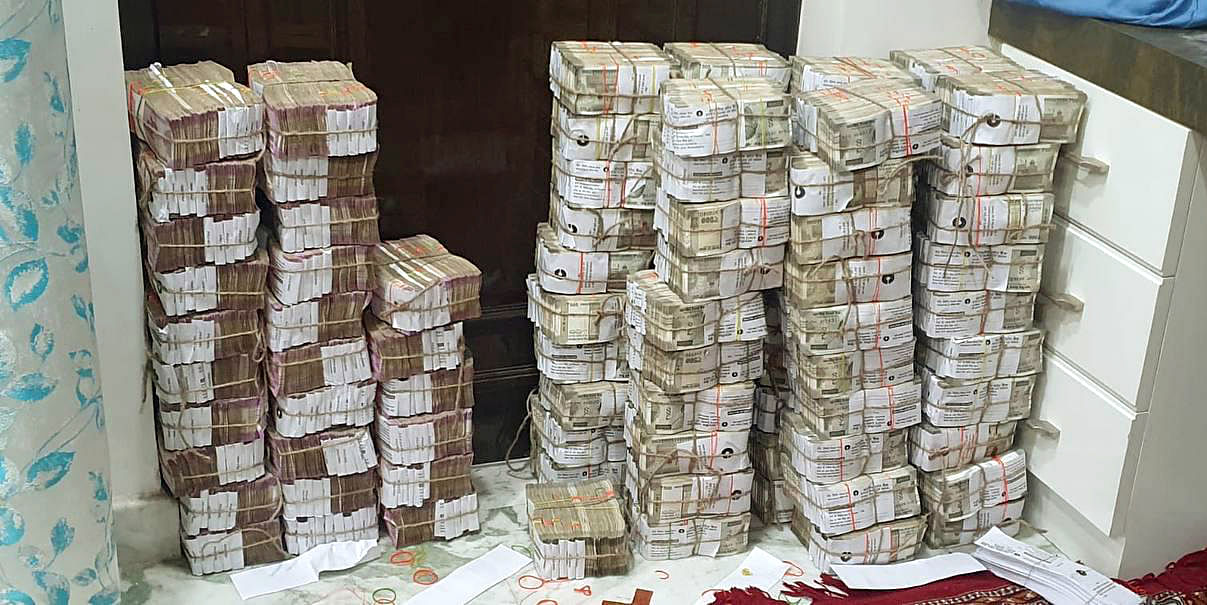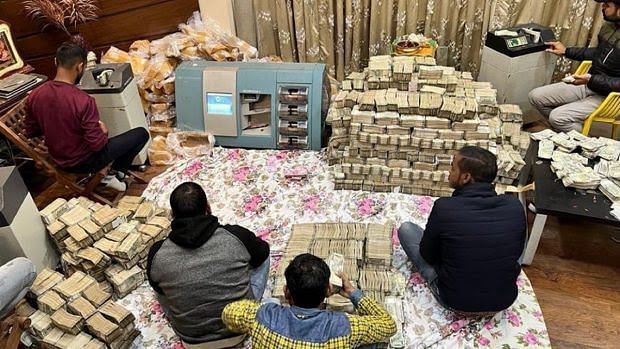New Delhi: Last month, officials at the Directorate General of Goods and Services Tax (GST) Intelligence Unit, Ahmedabad, seized Rs 197.49 crore of unaccounted-for cash from a Kanpur-based perfume trader. The cash recovery is the biggest ever done by the Central Board of Indirect Taxes and Customs (CBIC) in a case of GST evasion.
The businessman, Peeyush Jain, who runs a company called Odochem Industries, was arrested on 26 December after being booked under Section 132 of the Central GST (CGST) Act. The section deals with offences where the supply of any goods and services takes place without the issue of invoices with the intention to evade tax or in a scenario wherein invoices are issued against goods and services that simply do not exist for the purpose of fraudulently availing input tax refunds.
So what really happens to the cash recovered by officials, and what is the punishment under the said offences?
In Jain’s case, he allegedly connived with a transport company namely Ganpati Road Carriers to move goods from one state to another, by generating multiple invoices of below Rs 50,000 in the name of a non-existent firm, to avoid the generation of e-way bills. E-way bills are like transport permits issued if the amount of goods being moved is above Rs 50,000, to ensure smooth movement of goods and services across state borders.
“The transporter was also collecting the sale proceeds of such clandestine supply in cash and handing it over to the manufacturer, after deducting his commission,” a statement issued by the finance ministry said.
According to the CGST Act of 2017, if the tax evasion is found to be more than Rs 5 crore, the offence is cognisable and non-bailable, and officials can proceed with arrest.
The law also says that if the tax liability exceeds Rs 5 crore, the person will be liable to be imprisoned for a maximum period of five years.

Since the cash recovered from Jain’s premises in Kanpur and Kannauj runs into tens of crores, tax officials, who spoke on condition of anonymity, said the tax evasion is likely to be much more than Rs 5 crore and, therefore, will attract imprisonment of up to five years, along with a penalty.
“Cash can always remain with us as security till the matter is adjudicated,” the official cited above said.
Along with cash, the GST officials also recovered approximately 23 kg of gold and huge unaccounted-for raw materials used in manufacture of perfumery compounds, including more than 600 kg of sandalwood oil hidden in underground storage, having a market value of about Rs 6 crore.
The cash and other items collected during the search operations are usually kept in the safe custody of a state-owned bank until the matter is investigated. Once the tax dues are calculated on the seized cash and unaccounted-for sale proceeds, the money is adjusted from the cash seized.
I-T Act provisions more stringent
But here is the twist. When GST officials seize such a huge amount of cash, they share the information with the Regional Economic Intelligence Committee, which is a group of all central agencies like the Income Tax Department, Department of Revenue Intelligence, and Enforcement Directorate.
The committee is a forum overseeing government agencies responsible for economic intelligence and combating economic offences in states.
There is a sequential involvement of all intelligence agencies that comes into play. Once this takes place, Jain is likely to be booked under more cases, apart from the CGST Act. Additionally, the tax liabilities and penalties on him will also be made concurrently.
In cases where unaccounted-for money runs into hundreds of crores, the Central Economic Intelligence Agency, the apex body for all economic offences, is also informed.
According to a GST official, provisions of the I-T law are more stringent. Under Section 269ST of the I-T Act, any person who enters into a transaction of Rs 2 lakh or above in cash, will be liable to a penalty of an amount equivalent to the amount of the transaction. Therefore, Jain may end up paying more money in tax than seized after compounding for all the offences he has committed.
Also read: Man with ready cash, secret compound, ‘odour memory’: Peeyush Jain, who stashed away Rs 177 cr
Taxpayers’ appellate rights
It was clarified in Jain’s case that the seized cash was kept as case property in the custody of the State Bank of India pending further investigations. No deposit of tax dues has been made by Odochem Industries from the seized money to discharge tax liabilities and these are yet to be determined.
However, the department of revenue did clarify that Jain has voluntarily made an admission of guilt and there is evidence available on record to support the claims of the charges on him.
The officials said since this is a case where multiple agencies are involved, the matter will take at least six months to investigate, after which, a tax demand will be raised.
A showcause notice is issued by the authorities to the taxpayer. If the taxpayer disputes the taxable amount, the case can be challenged in various legal forums such as GST and I-T appellate authority, going up to the Supreme Court, where he will have to produce all documents related to the unaccounted-for proceeds and tax returns.
“The defendant has the right to appeal till the level of the Supreme Court,” a senior government official said.
(Edited by Neha Mahajan)
Also read: I-T raids entities involved in perfume trade in Uttar Pradesh, other locations



